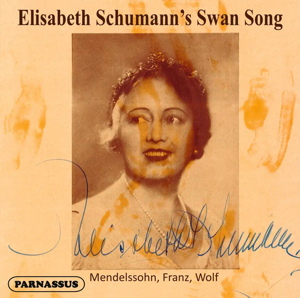
Elisabeth Schumann’s Swan Song
Elisabeth Schumann (soprano)
George Reeves, George Schick (pianos)
rec. 1950, Manhattan, New York, USA
Parnassus PACD96088 [74]
Elisabeth Schumann was born in 1888. Her first recordings were acoustics, made in 1915, although it is probably for her later, electrical recordings that she is better known. She had an illustrious operatic career, famous for such roles as Sophie in Der Rosenkavalier and Eva in Die Meisteringer, also excelling in Mozart with roles such as Pamina, Susanna, Zerlina and Blonde. She was a favourite of Richard Strauss, who even tried to persuade her to sing the role of Salome, creating an edition in which he reduced the size of the orchestra to accommodate her light, lyrical soprano, though she never took up the offer.
She was also highly regarded as a singer of Lieder and Lotte Lehmann, who was perhaps her greatest rival in the field, once said she represented the purest singing style of German Lieder. She has a large discography and many of her recordings, both acoustic and electrical were once issued in a six disc EMI box set (review), which now appears to be available as a Warner download.
The present recordings were made somewhat later in her home in Manhattan in 1950, when she would have been in her early sixties, and this appears to be the first time the sessions have been issued in their entirety. The accompanying notes are sketchy and inadequate. Included are brief biographies of Schumann and of George Schick and George Reeves, who I assume are the accompanists, but there is no indication as to which songs they play, nor which items are completely new to the catalogue.
Being late recordings, this is not a disc to which I would direct anyone interested in hearing “the purest singing stye of German Lieder”. Though the bell-like purity of Schumann’s top notes remains more or less intact, quite frankly, in the middle and lower register, she sounds all of her sixty odd years. Certainly, the voice has aged less well than some other sopranos, who also made recordings into their sixties, such as her contemporary Maggie Teyte or, of more recent singers, Renée Fleming. Some of the Wolf songs now clearly stretch her to the limit and I find myself wondering if this is the reason they were not issued before. One should probably make allowances for the way these songs were recorded (probably on a 7.5ips home recorder, according to the notes) but to my ears she sounds effortful and unsteady for much of the time.
She redeems herself in the final three bonus tracks, first in two acoustic Odeons of her singing Wolf’s Frage und Antwort and Straus’s Morgen (date and accompaniment unknown), followed by a later recording of her delivering in English a master class on Morgen, this time with Ernest Lush on the piano. No date is given, and I wonder if this was from one of her lecture tours of 1950 and 1951. If it was, then she sounds in much better voice here than she does on the home recordings. and she gives invaluable advice on singing the song, recollecting working on it with Strauss himself.
I hate to be negative about a much-loved artist, but this disc, I would suggest, is for completists only. Anyone wanting to discover the voice and art of this great soprano, will be much better served by the six-disc set detailed above.
Philip Tsaras
Buying this recording via a link below generates revenue for MWI, which helps the site remain free.


Contents
Felix Mendelssohn(1809-1847)
Das erste Veilchen
Die liebende Schreibt
Bei den Weige
Der Mond
Frühlingslied
Robert Franz (1815-1892)
Aus meinem grossen Schmerzen
Voglein wohin
Stille Scihereit
Bitte
Liebchen ist da
Mutter, o sing mich zur Ruh
Gute Nacht
Widmung
Hugo Wolf (1860-1903)
Bedecks mich mit Blumen
Gesegnet sei das Grün
O wär dein Haus durchsichtig wie ein Glas
Ihr jungen Leute
Wie glänzt der helle Mond
Du denks mit einem Fädchen mich zu fangen
In der Frühe
Sie blasen zum Abmarsch
Blumengruss
Nun wander Maria
Als ich auf dem Euphrat schiffte
Ein Ständchen euch zu bringen
Verbogenheit
Phanomen
Anakreons Grab
Nimmersatte Liebe
Frage und Antwort
Richard Strauss (1864-1949)
Morgen
Morgen Master class

















